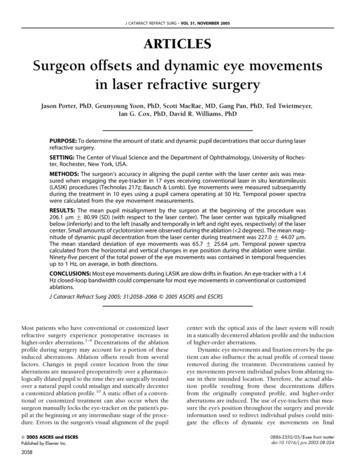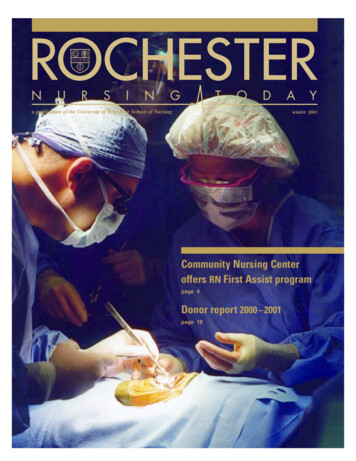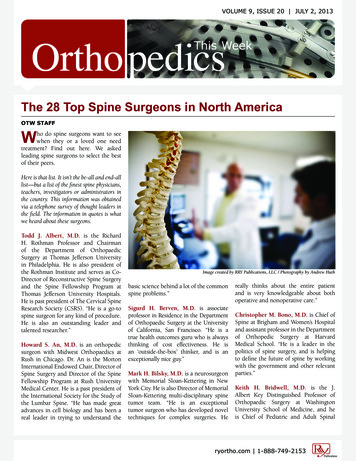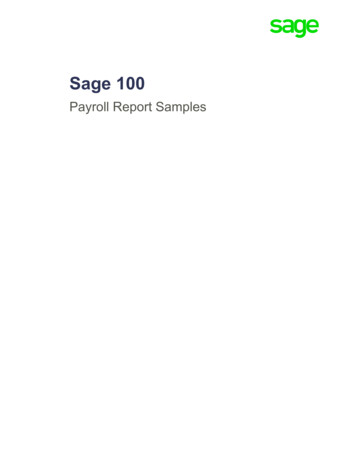
Transcription
A Report of the Surgeon GeneralHow Tobacco Smoke Causes Disease.what it means toSGR CS4.indd 111/29/10 11:57 AM
About the 2010 Surgeon General’s ReportThe 2010 Surgeon General’s report contains important newinformation about how tobacco smoke causes disease. The reportmakes it clear why we must protect others from tobacco smoke,especially children and pregnant women. It also helps explain whyit is so important to quit smoking . and why now is the time to quit.Regina M. Benjamin, MD, MBASurgeon GeneralThis Report of the Surgeon General on how tobacco smoke causesdisease includes the contributions of 64 health experts. The fullreport is more than 700 pages long. It is written for a scientificaudience. This summary has a message for everyone. Please shareit with your family, friends, and coworkers.Smoking cigarettes can kill you. This report is important because itreveals new scientific findings about how deadly cigarettes are andhow quickly they can damage your body. This new research alsosuggests that tobacco companies have altered cigarettes to makethem more addictive. Cigarettes are deadly.The Surgeon General is America’s doctor.The President appoints the Surgeon General as the highestranking health leader to protect the health of all Americans. TheSurgeon General uses the best scientific information available topromote health, to reduce risk for illness and injury, and to makethe nation healthier.To read the full report and its related materials, go towww.surgeongeneral.govSGR CS4.indd 211/29/10 11:57 AM
In this Booklet 12Children14DiabetesTobacco smoke is a deadly mix of more than 7,000 chemicals.Nicotine is powerfully addictive.Smoking can start your body on a path toward cancer.Smoking causes immediate damage to your arteries.Smoking damages your lungs.Smoking harms reproduction and your children’s health.1516SGR CS4.indd 3Smoking makes diabetes harder to control.FamiliesSecondhand smoke causes immediate harm to nonsmokers.QuitNow is the time to quit smoking.11/29/10 11:57 AM
poisonTobacco smoke is a deadly mix of more than 7,000 chemicals.Tobacco smokeis a toxic mixof more than7,000 chemicals. Manyare poisons. When thesechemicals get deep into your body’s tissues, theycause damage. Your body must fight to heal thedamage each time you smoke. Over time, thedamage can lead to disease.New research revealswhy the poisons intobacco smoke are sodeadly. Your doctorcan help you quit.The chemicals in tobacco smoke reach yourlungs quickly when you inhale. What this newreport shows is that these same poisonous chemicalsreach every organ in your body. They go quicklyfrom your lungs into your blood. Then theblood flows through your arteries. It carries thechemicals to tissues in all parts of your body.2A Report of the Surgeon GeneralYour lungs, blood vessels, and other delicatetissues become inflamed and damaged whenyou smoke.Smoking keeps your body under attack.If you spilled drain cleaner on your skin, itwould hurt and become inflamed. If you did thismany times a day, your skin would not have achance to heal. It would stay red, irritated, andinflamed. The organs in your body also havea lining of cells similar to skin. Chemicals intobacco smoke cause inflammation and damageto these cells. When you keep smoking, thedamage cannot heal.Smoking makes your immune system workovertime. Your body makes white blood cells
Damage isimmediate.The poisons in smokepose a danger rightaway. Sudden bloodclots, heart attacks,and strokes can betriggered by tobaccosmoke. Poisons intobacco smoke disruptthe way your bodyheals itself. Evensmoking a cigarettenow and then isenough to hurt you.Sitting in a smoky barraises your odds of aheart attack.Smoking longermeans moredamage.The more years yousmoke, the moreyou hurt your body.poisonto respond to injuries, infections, and evencancers. Blood tests show that your whiteblood cell numbers stay high when yousmoke. High numbers mean that your bodyis constantly fighting against the damagecaused by tobacco smoke. This constantstress disrupts how your body works. Newresearch shows that stress can lead to diseasein almost any part of your body.Scientists now know that your disease risksurges even higher after you have smokedfor about 20 years. But research shows that ifyou quit by age 30, your health could becomealmost as good as a nonsmoker’s. At any age,the sooner you quit, the sooner your body canbegin to heal.Tobaccosmokecontains adeadly mixof morethan 7,000chemicals.Hundredsare toxic.About 70can causecancer.Here aresome of thechemicals.How Tobacco Smoke Causes Disease: What It Means to You3
addictionNicotine is powerfully addictive.Addiction to nicotinechanges the chemicalbalance in your brain.Nicotine is ahighly addictivedrug. Addictionkeeps people smoking even when they wantto quit. Breaking addiction is harder for somepeople than others. Many people need morethan one try in order to quit.Scientists now know more about why the braincraves nicotine. Like heroin or cocaine, nicotinechanges the way your brain works and causesyou to crave more and more nicotine. Thesepowerful cravings make it hard for you to thinkabout anything else. Smoking can cause bothphysical and mental addiction.4A Report of the Surgeon GeneralCigarettes are designed for addiction.Cigarette makers have long known that nicotineaddiction helps sell their products. Cigarettestoday deliver more nicotine and deliver itquicker than ever before. The additives andchemicals that tobacco companies put incigarettes may have helped make them moreaddictive. Once inhaled, nicotine races fromyour lungs to your heart and brain.You might have thought that “filtered,” “lowtar,” or “light” cigarettes were less dangerousthan others. But research shows that thesecigarettes are every bit as addictive and are nosafer than other cigarettes. Misleading labels areno longer allowed.
Many teens who try cigarettes don’t know howeasy it is to become addicted. Nicotine addictionis so powerful that every day about 1,000 teensbecome daily smokers. Why is this important?Because most current smokers became addictedas teenagers.You can beat addiction to tobacco.Smokers who quit go through withdrawal.The first days are the most uncomfortable. Thephysical symptoms of nicotine addiction endabout 3 weeks after you quit smoking. But youmay still have an urge to smoke when you wakeup, drink coffee, or are out with friends. It takeslonger to break these patterns. But you can beatthe mental addiction, too.Call 1-800-QUIT-NOW for free advice andsupport. Experienced counselors will help youmake a quit plan that works for you. Peoplewho get coaching are more likely to succeedthan those who try to quit smoking on theirown. Many other groups also offer booklets,programs, and advice to help smokers quit.Talk to your doctor about quitting, and see thequit page at the back of this booklet.If you’ve already tried other ways, ask your doctorabout nicotine replacements or new medicines tohelp you quit. They help you control the cravingsof nicotine withdrawal.Your most important step to better health is toquit smoking. It’s up to you. Now is the time.what it means to YOUIf you quit a pack-a-day habit, you willsave about 2,000 per year by not buyingcigarettes. That would buy a familyvacation or down payment on a car.You can beat addiction to nicotine.More than half of all adults who eversmoked have quit. So can you.How Tobacco Smoke Causes Disease: What It Means to You5addictionTeens are more sensitive to nicotine.Each day, about 4,000 teens smoke a cigarettefor the first time. That’s nearly 1.5 millionyouth per year. It’s as many people as the entirepopulation of a city like Philadelphia.
cancerSmoking can start your body on a path toward cancer.Smoking todaycan cost you inthe future. Oncetobacco has damagedcells, they can grow uncontrollably as cancer.Because cells are tiny, years sometimes passbefore you find a lump or your doctor sees atumor on a scan.Every cigaretteincreases the riskfor cancer.DNA damage leads to cancer.DNA is the cell’s “instruction manual.” Itcontrols a cell’s normal growth and function.When DNA is damaged, a cell can begingrowing out of control and create a cancertumor. This happens because poisons intobacco smoke can destroy or change the cell’sinstructions. The next cigarette you smoke6A Report of the Surgeon Generalmight damage your DNA in a way that leads tocancer.Normally, your immune system helps to protectyou from cancer. It sends out tumor fightersto attack and kill cancer cells. However, newresearch shows that the poisons in cigarettesmoke weaken the tumor fighters. When thishappens, cells keep growing without beingstopped. For this reason, smoking can cause cancerand then block your body from fighting it.Breathing tobacco smoke when you alreadyhave cancer is especially dangerous. Newresearch shows that tobacco smoke helps tumorsgrow. It can undo the benefits of chemotherapy.Being smoke-free will help your body heal.
Here are some of thecancers that researchersknow smoking causes.mouth, nose,and throatTen years after you quit smoking, your risk fordying from lung cancer drops by half. Andthere are benefits of quitting at ANY age.Quitting smoking saves lives.larynxtracheaesophaguslungs. what it means to YOUstomachpancreasWithin 5 years of quitting, yourkidneys andureterschance of cancer of the mouth,throat, esophagus, and bladder isbladdercut in half. If nobody smoked,cervix1 of every 3 cancer deaths in thebone marrowand bloodUnited Stateswould nothappen.Chemicals in tobacco smoke can start cells throughoutyour body on a path toward cancer. For example, here’show smoking causes dangerous bladder cancer.Repeated irritationby cancer-causingchemicals stressescells in yourbladder.sometimescausing atumor tobegin.and togrow out ofcontrolas cancer.How Tobacco Smoke Causes Disease: What It Means to You7cancerDoctors have known for years that smokingcauses most lung cancers. Nearly 9 out of 10 menwho die from lung cancer smoke. About 3,000nonsmokers die each year from lung cancercaused by secondhand smoke.Smoking can cause cancer almostanywhere in your body.
circulatorySmoking causes immediate damage to your arteries.Smoking can cause aneurysms, which arebulging blood vessels thatcan burst and cause death stroke, which is suddendeath of brain cells causedby blood clots or bleeding heart attack and damage toyour arteriesBreathing tobaccosmoke canchange yourblood chemistry. Thisdamages blood vessels. Almost immediately, cellsthat line your body’s blood vessels react to the poisonsin tobacco smoke. Your heart rate and bloodpressure go up. Your blood vessels thicken andgrow narrower.Smoking increasesthe danger of heartattack and stroke.Smoking alters your blood chemistry.When you get a cut, blood cells called plateletsstick together to form a clot. This helps stopthe cut from bleeding. However, blood clotscause trouble when they form inside your body.Chemical changes caused by smoking makeblood too sticky. Deadly clots form that canblock blood flow to your heart, brain, or legs.8A Report of the Surgeon GeneralBreathing tobacco smoke causes other changesin your blood. Your triglyceride level rises,and your “good cholesterol” level falls. Thechemicals in tobacco smoke also prevent yourbody from repairing damaged places in thelining of your arteries. Clots are more likely toform in a damaged artery.Smoking leads to heart attack and stroke.Smoking is one cause of dangerous plaquebuildup inside your arteries. Plaque is madeof cholesterol and scar tissue. It clogs andnarrows your arteries. This can trigger chestpain, weakness, heart attack, or stroke. Plaquecan rupture and cause clots that block arteries.Completely blocked arteries can causesudden death.
Secondhand smoke triggers heart attacks.Tobacco smoke hurts anyone who breathes it.When you breathe secondhand smoke, plateletsin your blood get sticky and may form clots,just like in a person who smokes. New researchshows that even spending time in a smoky roomcould trigger a heart attack. Smoking is not theonly cause of these problems, but it makes themmuch worse.PlaqueClotPlaque narrows vessels so less blood can flow through.When a clot forms in one of these narrow places in anartery around the heart, your heart muscle becomesstarved for the oxygen it needs.Quitting can save your life.If you already have heart or artery disease, youhave years of life to gain by quitting smoking.Your risk for a heart attack drops sharply just1 year after you quit smoking. After 2 to 5 years,your chance of stroke could fall to about thesame as a nonsmoker’s. You will feel better andcan be more active when cigarettes are gonefrom your life.A public smoking bandrastically cut heart attacks. what it means to YOU257 heart attacksper 100,000Smoking around others increasesPueblo, Colorado banned smoking in workplaces and all public areas in July 2003. Thenumber of people hospitalized for heart attacksdropped 41 percent in 3 years.187 heart attacksper 100,000their risk for heart attack and152 heart attacksper 100,000death. By not smoking, you helpprotect your family, friends, andcoworkers.Smoking banJanuary 2002 - June 2003July 2003 - December 2004January 2005 - June 2006How Tobacco Smoke Causes Disease: What It Means to You9circulatoryWhen your arteries are narrowed and blockedfrom smoking, you may have other problems, too.Blockages reduce blood flow in your legs andskin. Tissue slowly dies. You may develop skinulcers. Eventually, your toes, feet, or legs can beso damaged that they must be amputated.
respiratorySmoking damages your lungs.Every cigarette yousmoke damagesyour breathing.New research shows thatpoisons in tobacco smokeharm your body from themoment they enter your mouth. They attack theinner tissue on the way to your lungs.Even after the age of65, quitting tobaccocan add years to yourlife. You will breathebetter and feel better.Your body is telling you not to smoke.The first time you smoke, your lungs mayfeel like they are burning. You may coughviolently. That’s your body telling you it’sbeing poisoned.Tiny, brush-like cilia line your airways. Theysweep out mucus and dirt so your lungs stayclear. Over time, smoking damages and destroys10A Report of the Surgeon Generalthese brushes. You get “smokers’ cough” becauseyour body makes more mucus and the cilia canno longer clear your lungs. Other damage ishappening, too.When you quit smoking, you will cough andwheeze less. You will cough up less mucus.After a few smoke-free months, you willbreathe easier.Tobacco smoke scars your lungs.Your lungs should be elastic like a balloon.They expand when you breathe in andcompress when you breathe out. The poisonsin tobacco smoke inflame the delicate lining ofyour lungs. Years of smoking can damage yourlungs so much that they no longer stretch andexchange air.
respiratorySmoking causes lung disease.Smoking causes chronic obstructivepulmonary disease, or COPD. There is nocure. People with COPD slowly die fromlack of air. COPD includes the diseasesemphysema and chronic bronchitis. Emphysema causes the walls between theair sacs in your lungs to lose their abilityto stretch and shrink back. The air sacsbecome weaker and wider. Air gets trappedin your lungs. You have trouble breathing inoxygen and breathing out carbon dioxide.If you keep smoking, normal breathing maybecome harder as emphysema develops.With emphysema, lung tissue is destroyed,making it very hard to get enough oxygen.Chronic bronchitis is the swelling of thelining of your bronchial tubes. When thishappens, you have less air flow to and fromyour lungs. You cough up heavy mucus withchronic bronchitis.COPD caused by smoking makes you weak from lackof oxygen. Eventually, you may have to live on oxygenfrom a tank.Pneumonia and respiratory problems are farmore common in smokers. For people withasthma, even breathing someone else’s smokecan trigger a severe attack. Your airways becomeinflamed and tight. It’s hard to breathe. what it means to YOUIf you quit smoking, you willbreathe better. You will coughless than people who continue tosmoke. You’ll be surprised howmuch easier it is to be active.How Tobacco Smoke Causes Disease: What It Means to You11
childrenSmoking harms reproduction and your children’s health.Pregnant womenwho smoke aremore likely to havebabies who diefrom sudden infantdeath syndrome,or SIDS. If you arepregnant, smokingis dangerous.Breathingsecondhand smokeis dangerous, too.12Smoking orbreathingsecondhand smokecan make it harder foryou to become a parent.Research shows thattobacco smoke decreasesyour chances of having ahealthy baby.A Report of the Surgeon GeneralSmoking hurts people hoping to becomeparents.Smoking reduces a woman’s chance of gettingpregnant. Chemicals in smoke interferewith the functioning of the tubes that youreggs travel through to reach the womb. Thismight decrease fertility or lead to pregnancycomplications.Researchers have also found that smokingmight damage the DNA in men’s sperm. ThisDNA damage might decrease fertility, causebirth defects, or lead to miscarriage.
Tobacco smoke damages the tissues of anunborn baby’s growing brain and lungs. Whena pregnant woman smokes, there could also beproblems with the growth of the placenta (theorgan that feeds the baby). Problems with theplacenta could lead to miscarriage, prematuredelivery, or low birth weight. Smoking caneven make the placenta detach from the wombtoo early. If this happens, you will miscarry ordeliver your baby too early.Tobacco smoke hurts babies and children.Mothers know it is important to quit smokingwhile they are pregnant. But starting to smokeagain after your baby is born is also dangerous.Babies who breathe secondhand smoke aremore likely to die from SIDS.Babies and children who breathe secondhandsmoke have other health problems. Their lungsdon’t work as well. Over half of all children inthe United States breathe secondhand smokeat home, in cars, or in public places. Morethan 300,000 children suffer each year frominfections caused by tobacco smoke, includingbronchitis, pneumonia, and ear infections. Theywheeze and cough more often.For children who have asthma, breathingsecondhand smoke can trigger an attack. Theattack can be severe enough to send a child tothe hospital. Sometimes an asthma attack is sosevere that a child dies.One in every five babies born to mothers who smokehas low birth weight. Low birth weight is a leadingcause of infant death.How Tobacco Smoke Causes Disease: What It Means to You13childrenSmoking hurts unborn babies.Smoking during pregnancy increases therisk of pregnancy complications, prematuredelivery, low birth weight infants, stillbirth,and sudden infant death syndrome (SIDS).Premature delivery is when a baby is born tooearly. Low birth weight is when a baby weighsless than 5 1/2 pounds. Babies born too earlyor too small are not as healthy. Babies whosemothers smoke are about 3 times more likely todie from SIDS (crib death).
diabetesSmoking makes diabetes harder to control.We now knowthat poisonsin tobaccosmoke affect your bloodsugar. Smoking evenincreases your chance ofhaving type 2 diabetes. People with diabetes whosmoke need more insulin than those who don’tsmoke. They are also more likely to have serioushealth problems from diabetes.New scienceshows that peoplewith diabetes areespecially affected bytobacco smoke. what it means to YOUThe health benefits for people withdiabetes who stop smoking beginimmediately. Diabetics who quitsmoking have better control overtheir blood sugar levels.14A Report of the Surgeon GeneralSmokers with diabetes have higher risks forserious complications, including heart and kidney disease amputation retinopathy (eye disease causing blindness) peripheral neuropathy (nerve damage). Suchdamage short circuits your body’s electricalsystem. It causes numbness, pain, weakness,and poor coordination. People with diabeteswho smoke are three times more likely tohave this nerve damage.Not smoking can make diabetes easier to control.You can even recover from surgery faster.
familiesSecondhand smoke causes immediate harm to nonsmokers.Protect your family from secondhandsmoke. Secondhand smoke causesimmediate harm to nonsmokers whobreathe it. If you are a nonsmoker, you can dosome important things to protect yourself andyour family. Do not allow anyone to smoke anywhere in ornear your home. Some of the smoke stays inyour house even if you only allow smokingnear an open window. Allowing someone tosmoke in only one roomdoes not protect nonsmokers.Smoke from halls and stairsgets inside, too.Do not allow anyone to smoke in your car,even with the window down. No amount ofsmoke is safe.Make sure your children’s day care centersand schools are tobacco-free. A tobaccofree campus policy prohibits any tobaccouse or advertising on school property byanyone at any time. This includes offcampus school events.If your state still allows smoking in publicareas, look for restaurants and other placesthat do not allow smoking. “No-smokingsections” do not protect you and your familyfrom secondhand smoke.Teach your children to stay away fromsecondhand smoke. Be a good role model bynot smoking.How Tobacco Smoke Causes Disease: What It Means to You15
QUITNow is the time to quit smoking.The new research in this report shows thescientific reasons to quit smoking. But peoplewho quit do it for their own personal reasons.What are yours? I want more years with my family andfriends. I want to be around to share birthdays withmy kids. I want fewer sick days and lost wages. I want to be at my daughter’s wedding. I want to know my grandkids. I want more energy. I want to breathe easier. I want to enjoy the smell and taste of food. I want to be a better role model. My pet needs me. I am tired of standing outside in the cold. I want to spend my money on somethingbesides cigarettes. I want to live to enjoy retirement.16When you are ready, here are some ways to begin. Talk to your doctor. Consider nicotinereplacement therapy or medication. Find a support program. Social supporthelps when you are trying to quit. Focus on eating right and being active. Don’t get discouraged. Quitting often takesseveral tries before you succeed. what it means to YOUNow is the time to quit smoking. Noone can make you quit, and no onecan do it for you. Even if you havesmoked for many years, you CAN quit.For more information, go towww.smokefree.govor call 1-800-QUIT-NOW.
Suggested citation:U.S. Department of Health and Human Services. A Report of the Surgeon General: How Tobacco SmokeCauses Disease: What It Means to You. U.S. Department of Health and Human Services, Centers for DiseaseControl and Prevention, National Center for Chronic Disease Prevention and Health Promotion, Office onSmoking and Health, 2010.
For more informationYou can read the full Report of the Surgeon General on how tobacco smoke causesdisease at this Web site: www.surgeongeneral.govFor more information on the dangers of tobacco smoke, talk to your doctor, nurse,pharmacist, or other health care professional.More facts and advice are available from theCenters for Disease Control and Prevention at www.cdc.gov/tobaccoToll free: 1-800-CDC-INFO (1-800-232-4636)In English and en Español, 24 hours/day, 7 days/weekText telephone for hearing impaired: 1-888-232-6348Other helpful information is available at www.smokefree.govTo access a telephone quitline serving your area, call1-800-QUIT-NOW (1-800-784-8669).
quit page at the back of this booklet. If you’ve already tried other ways, ask your doctor about nicotine replacements or new medicines to help you quit. They help you control the cravings of nicotine withdrawal. Your most important step to better health is t










